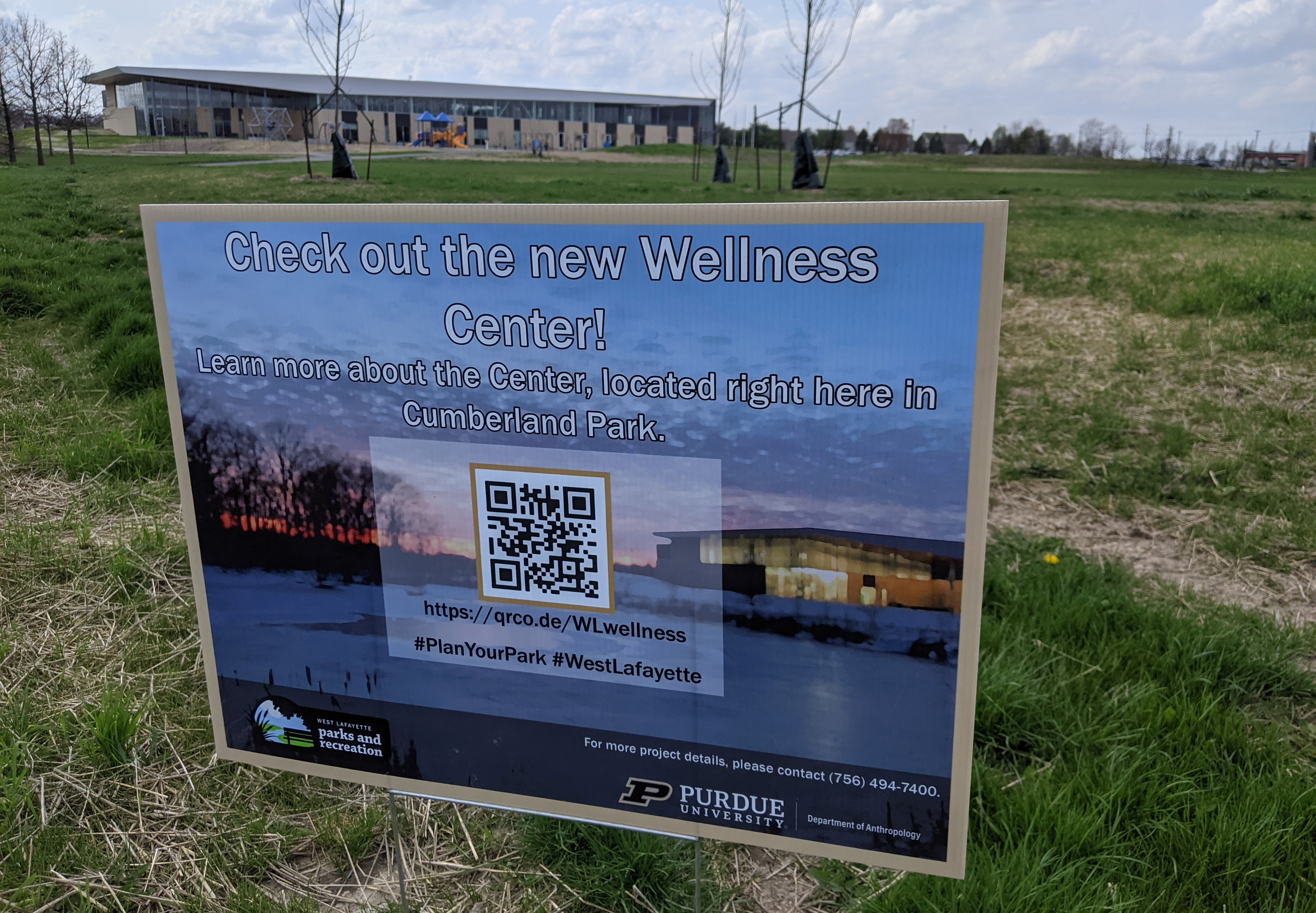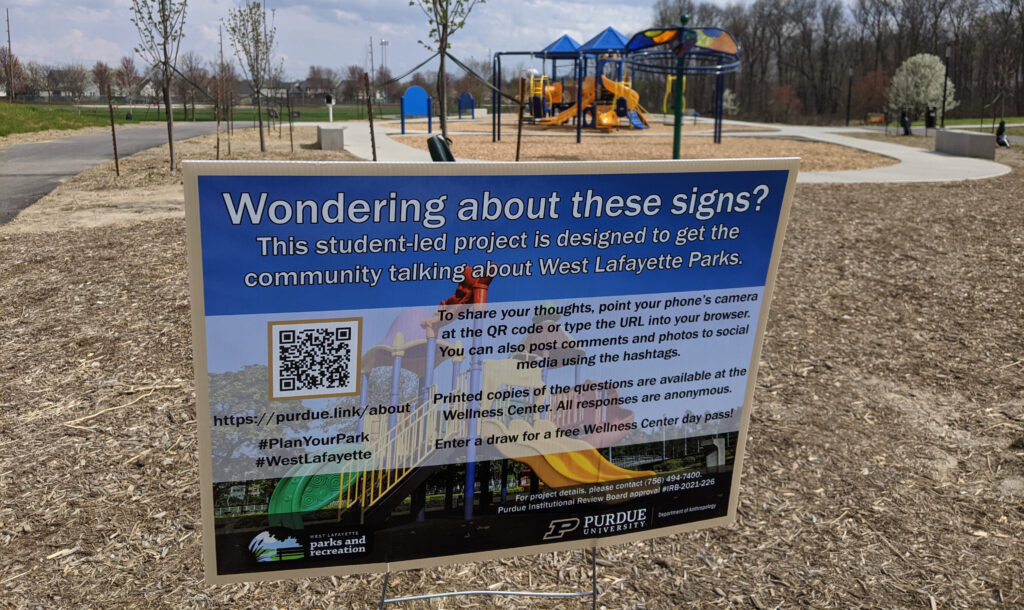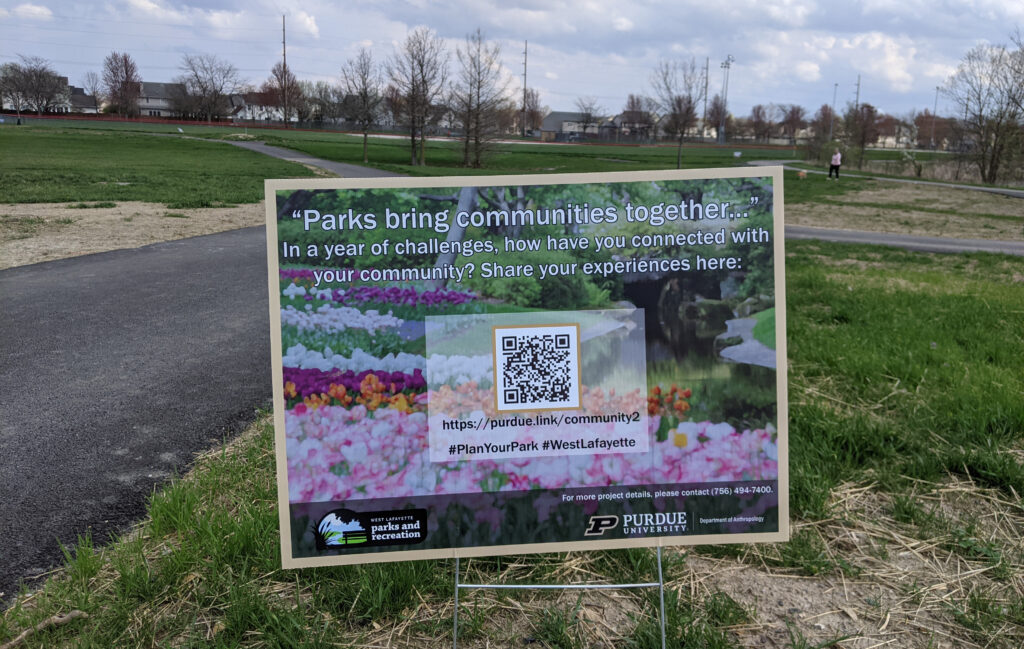Parks project is perfectly Purdue
Applied anthropology students have partnered with the City of West Lafayette to engage with Cumberland Park visitors about the park and its new wellness center

In the realm of the town and gown, a recent collaboration between the Purdue anthropology department and the City of West Lafayette is a certified win-win.
Focused on the $34 million West Lafayette Wellness Center, which opened in February, this is the most recent municipal project involving Purdue’s applied anthropology students as part of an innovative, five-year memorandum of understanding between the two entities.
The pact has proven beneficial to both parties, as city leaders have been able to tap into young minds accustomed to outside-the-box thinking, while students acquire skills necessary to navigate real-world endeavors.
“Our partner is a municipal government, which is not very common,” said Zoe Nyssa, assistant professor of anthropology, who, along with Sherylyn Briller, teaches the applied anthropology classes that include city-student interaction. “The students get access to a range of people they wouldn’t normally get to, they get to positively impact the communities of West Lafayette, and really understand how the city works and how government works and help build capacity within the neighborhoods.”
Nyssa and Briller worked with Bryce Patz, the city’s community forestry and greenspace manager, to establish the five-year agreement. She added that Lindsey Payne, director of service learning at Purdue’s Office of Engagement, provided instrumental guidance in launching the project.
“The project, in a literal way, was made possible because the students were awarded two grants from the Office of Engagement,” Nyssa said. “They’ve been super-supportive and amazing, and I would say the same thing for the College of Liberal Arts and the Department of Anthropology, as well. What we’re building here wouldn’t be possible anywhere except here. I look around at the other programs and I think that what we’re building with our Anthropologies of Tomorrow initiative is pretty amazing. And it’s possible because of the supports that have been put in place.”
Patz shared Nyssa’s optimism concerning the project, noting that “we wanted to partner with (Purdue anthropology) to improve our services, and anthropology helps that because it enables us to read between the lines to provide a better product and process.
“The Wellness Center is a very big project for Parks and Recreation,” Patz continued. “We did strategic planning for a few years to have a rec center for the community to use. We’re working with Purdue on how to best use the space in the world of COVID.”

Throughout the collaboration, students have provided West Lafayette citizens opportunities to share their feelings about their city. In early April, students installed nearly two dozen signs (complete with QR codes ready for scanning) in Cumberland Park near the Wellness Center seeking input from residents about the facility.
“The QR code links to a questionnaire that the students designed that asks about visitors’ park usage, their behavior, and their perceptions of greenspace in the city,” Nyssa said. “And then – more interesting to me – there is a broader set of questions about how people have connected with the community over the course of the pandemic and the ways they’re thinking about their city.”
Patz said one of the aspects of working with students he most enjoyed was seeing those individuals “plug in” to the community. He added that the students weren’t the only individuals learning something.
“It’s been great,” Patz said. “There’s such a diverse group of students with diverse backgrounds. Collaborating with them has exceeded our expectations in terms of how to do things better. It’s been a very positive experience. I’ve learned a lot and I hope the students have learned, too. It’s been a great partnership and I hope it lasts beyond five years.”
Rebecca Martinez, a first-year graduate student in the applied anthropology track, has been involved remotely from her home in Kansas City, Missouri, but said she did feel like part of the West Lafayette community. She hopes that feeling will deepen once she arrives on campus in June.
“This has been a particularly challenging year for so many people. I started my graduate experience thinking I’d be moving to West Lafayette, and that didn’t happen,” said Martinez, who has spent much of the last decade working in community-building in the West African country of Liberia. “But this project, because of the questions we ask … has made it different, but just as enriching. I feel more connected than I would have ever felt connected by having to do this project remotely.”
Second-year graduate student Amanda Waller agreed, noting that “putting students into the community of West Lafayette and what’s going on in the city is really beneficial. It connects us into the community in a way I don’t think we’d have otherwise. I have enjoyed working with Bryce Patz through the neighborhood vitality and greenspace coordination. He has been truly amazing, and he has made sure we have everything that we need and has gotten us in contact with so many different people.
“We couldn’t have done this without him, and the city has been so open to us. Overall, it’s been a great experience. I’m glad we had the opportunity to do it.”
Other students taking part in the collaboration this semester include Rebecca Eli Long (whom Nyssa said designed the signs), Adam Kotanko, Alejandra Duran Trinidad, and Kilian Kelly.
The collaborators plan to collect citizen input regarding the Wellness Center for several months, with a public presentation and comprehensive report set for the fall.
Nyssa views the collaboration concerning the facility – which features basketball courts, an indoor track, an aquatics center, fitness equipment, and meeting space, among other amenities – as a quintessential characteristic of Purdue.
“The project itself has been a wonderful learning experience for the students because it combines a lot of what Purdue is known for – really rigorous social-science thinking and methods with novel research technologies to address community needs and service learning,” Nyssa said. “It’s kind of a perfect Purdue project.”
